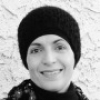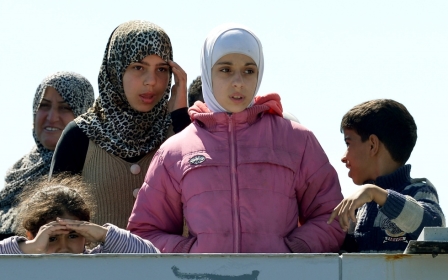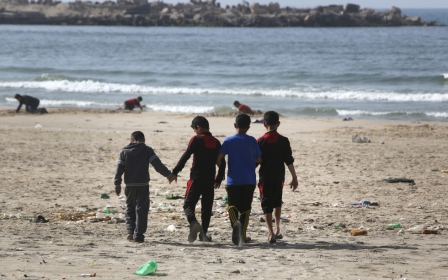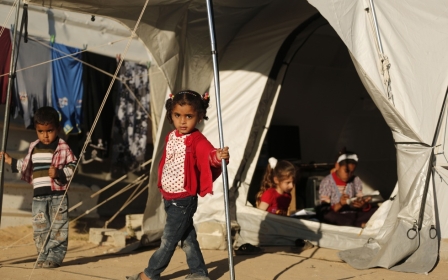The Nakba 67 years on: Holding on tight to our long postponed dreams
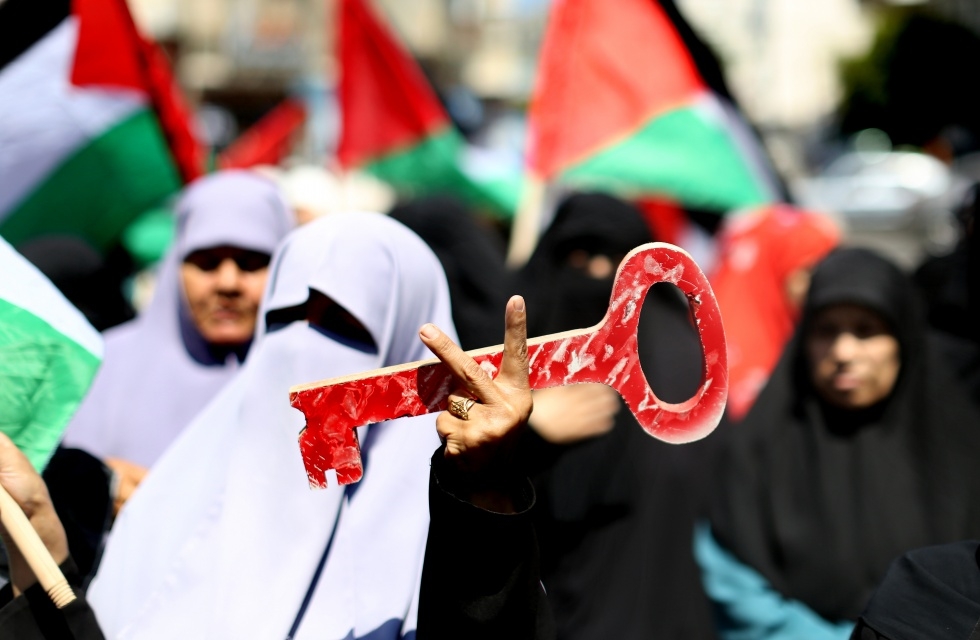
Sixty-seven years ago, Palestinians woke up to a tragedy that ravaged their hearts and distorted Palestinian life forever. Over 800,000 people, approximately half of the population of then-mandatory Palestine, were evicted from their homes and their ancestors’ lands. The horror was engraved on all of the faces; a language and reality they shared for decades - many to this day.
Scattered all over the Middle East and prevented by Israel from returning home, dignified landowners who overnight had turned into refugees didn't need to ask about the fate of their home. The broken bodies and spirits of hundreds of thousands forced into exile answered their question. Palestine was no more.
Today, almost seven decades after the ethnic cleansing, some of the Palestinians born in Palestine are still alive and still remember the horror of the 1948 dispossession and those miserable days. The generations who were born after the loss of their homeland - be it under the Israeli military occupation or in exile - and who didn’t witness the tragic experiences lived by parents and grandparents, do still retain the story. In their hearts and minds, the memory of the Nakba (catastrophe) is as strong, present and fresh as for those who witnessed it and so are the hopes and dreams that refuse to fade despite the savage winds of war and time.
Unable to return to their home that became present-day Israel, Palestinian refugees were obliged to live in great uncertainty about their future in the 59 refugee camps established by the United Nations. There, they awaited action by the international community to pressure Israel to implement the right of return. Sitting in their tents winter after winter, the only hope for them back then was the one offered by Article 11 of UN Resolution 194 of 1948, which resolves that “the refugees wishing to return to their homes and live at peace with their neighbours should be permitted to do so at the earliest practicable date”. Sixty-seven years after that belated date, millions of Palestinian refugees are still barred from returning home and still live a life of perpetual waiting, enduring multiple hardships in their long exile.
A quick glimpse at the situation of Palestinian refugees in Yarmouk refugee camp in Syria, the refugees locked in the Gaza prison, those living behind the apartheid wall in the West Bank, those Palestinians who are currently on the run for their lives in Yemen and those risking their lives in the Mediterranean taking death journeys to escape insecurity and search for safety for their families, tells the same old and new story of continued Nakba, one of constant suffering with no end in sight.
Horrific pictures and catastrophic stories of Palestinian refugees continue to come in different forms and shapes adding more unkind chapters to the devastating mother story of the 1948 disaster. Mohammed Maddi, 36 years old from Gaza, is the latest victim in the ongoing Palestinian Nakba. The young father passed away on 4 May in Abu Yussef al-Najjar hospital in Rafah refugee camp. He had waited in vain for over six months for Gaza’s only border crossing with Egypt to open. When his hopes for the opening of Rafah gate faded away, he applied for a permit to travel through Israel to receive treatment available either in the West Bank or Jordanian hospitals. A piece of paper that granted life or death, hope or despair, called a permit, was never issued despite the seriousness of Mohammed’s condition and the worsening of his health. Doctors in Gaza did all that they could given the hospital’s thin resources, severe shortages of medicines and medical products resulting from the inhumane blockade imposed by the Israeli occupation, the longest in human history. At the end of a nine-month battle with cancer, Mohammed succumbed to a fate he might have avoided had he not lived in Gaza.
Living under the constant fear and despair of possibly losing his son in Gaza - where everything is uncertain and basic life necessities such as electricity, fuel and nowadays water are unavailable for most of the day - Mohammed’s father sent a plea to the world. In an interview with Al-Watan Voice, hours before his son’s death, the father broke into tears asking the interviewer: “My son is dying a hundred times a day, every day. I want him to live for his children. Tell me where to go, please. Borders are closed, doors of life are shut and everything is closed. Can anyone tell me where to go? World, Arabs, this is unfair. Where is humanity?”
Mohammed’s tragic story and the words of his father provide just a single example of what denial and oppression mean to Palestinian refugees. The story summed it all up and exposed the 67 years of open wounds. This is an ongoing Nakba for Palestinians living under the Israeli colonial enterprise, as well as for those Palestinians scattered far away from home, trapped in war zones with a suspended present and no future, no place to go, no papers, no documents, no alternatives and no hope.
On the other hand, the story of Mohammed and the words of his father create the story of a grand nation with a rich culture and history that was abandoned by humanity, yet created a determined people with aspirations and an unshakable belief in their rights and their cause. These refugees are resilient and steadfast despite the horrors to which they have been subjected. They are still able to question, rationalise and look for alternatives. They are still able to shake the silence and make their demands, love for life and anguish heard. Their story is one of Palestinian heroes in and outside Gaza hospitals working day and night on half or no salaries.
The narrative about refugees is always associated with empathy, poverty, backwardness, powerlessness and violence. The story of Palestinian refugees, however, extends far beyond the de-contextualised renderings of that mainstream narrative. Poverty and violence are imposed on Palestinian refugees who, despite the unbearable situation, are still counted among the best educated and hardest working in the Middle East. They still hold on tight to their dreams and demands for rights.
On the 67th anniversary of the Nakba, the new generations are better aware of their rights, and ready to fight to gain them back. Moreover, refugees have started to address publicly the reality that many of them have shared privately: Palestinians are being erased not just by Israel, but also by the powers and systems that endorsed the 1948 tragedy, allowing it to continue unchallenged. They are further harmed by complicit governments’ silence.
When I saw my grandmother following last summer’s barbaric Israeli assault on Gaza, she repeated to me and to my children Tarek, 14, and Aziz, 6, the same words she had said in 2012. She talked about our village, Beit Daras, from which she was expelled in 1948. She talked about its beauty, freshness, water well, land, farms and the sycamore trees that she loved dearly. She also repeated once again that she is no longer worried about the future that she's wanted for so long. She looked to us and said "For many years, I felt as if I were walking alone. And as you know, walking alone is not a pleasant way to make a journey. Now, because of my age, I cannot walk, but I'm not alone anymore. I can now rest in peace even if I am not yet in Beit Daras. I now know that Beit Daras is in your heart, and I also know that you are not alone in your journey.”
- Ghada Ageel is a visiting professor at the University of Alberta Political Science Department (Edmonton, Canada), an independent scholar, and active in the Faculty4Palestine-Alberta. Her new book “Apartheid in Palestine: Hard Laws and harder experiences” is forthcoming with the University of Alberta Press - Canada.
The views expressed in this article belong to the author and do not necessarily reflect the editorial policy of Middle East Eye.
Photo: A Palestinian woman holds a cutout symbolizing a key ahead of Nakba commemorations on 6 May (AFP)
Middle East Eye propose une couverture et une analyse indépendantes et incomparables du Moyen-Orient, de l’Afrique du Nord et d’autres régions du monde. Pour en savoir plus sur la reprise de ce contenu et les frais qui s’appliquent, veuillez remplir ce formulaire [en anglais]. Pour en savoir plus sur MEE, cliquez ici [en anglais].


